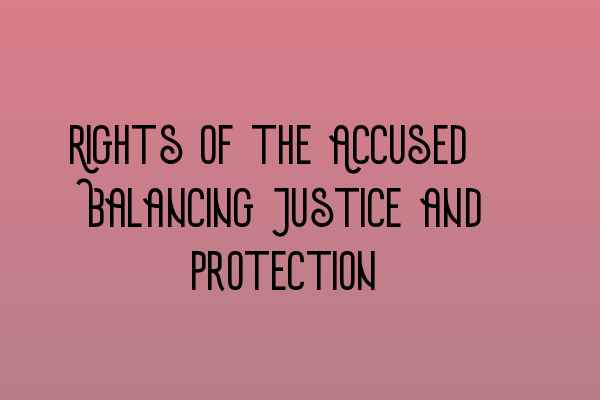Rights of the Accused: Balancing Justice and Protection
When it comes to criminal law, one of the fundamental principles of justice is ensuring the rights of the accused are protected. This delicate balance between justice and protection is crucial to maintain a fair and impartial legal system. In this article, we will explore the key rights that the accused are entitled to and how they are safeguarded in the UK legal framework.
Presumption of Innocence
The cornerstone of any criminal trial is the presumption of innocence. This means that every accused person is considered innocent until proven guilty, placing the burden of proof on the prosecution. The presumption of innocence ensures that no individual is unfairly treated or unjustly incarcerated without sufficient evidence.
However, the accused’s right to be presumed innocent does not mean they are completely shielded from the legal process. It simply means that the burden of proof lies with the prosecution, and the accused is entitled to a fair trial where their innocence or guilt is determined based on the evidence presented.
Right to Legal Representation
Another crucial right for the accused is the right to legal representation. Adequate legal counsel ensures that the accused can effectively present their case and challenge the evidence brought against them. Without skilled legal representation, the accused may be at a significant disadvantage in navigating the complexities of the legal system.
The importance of this right cannot be overstated. Criminal defense lawyers play a crucial role in protecting the rights of the accused, advising them on their legal options, and ensuring that their side of the story is heard and considered.
If you’re looking to become a criminal defense lawyer and want to prepare for the SQE exams, check out our comprehensive SQE 1 Preparation Courses and SQE 2 Preparation Courses to enhance your legal knowledge and skills.
Right to Remain Silent
The famous phrase “You have the right to remain silent” is an essential component of the accused’s rights. This right, commonly referred to as the right to silence, ensures that no individual can be compelled to incriminate themselves.
While the accused does have the right to remain silent, it’s important to note that their silence can be taken into account in certain circumstances. However, the right to silence forms an integral part of protecting the accused from self-incrimination and guaranteeing a fair trial.
Right to a Speedy Trial
In the interests of justice, the accused has the right to a speedy trial. This right ensures that individuals do not languish in pretrial detention for an extended period without their case being resolved. It serves to protect the accused from prolonged uncertainty and potential violation of their rights, ensuring a fair and efficient legal process.
If you’re looking to stay updated on the latest SRA SQE Exam Dates and want to prepare effectively, be sure to check our website for the most accurate and reliable information.
Conclusion
Protecting the rights of the accused while maintaining the balance of justice is a challenging task. However, it is the hallmark of a fair and democratic legal system. The rights discussed in this article are just a snapshot of the numerous protections afforded to the accused.
If you’re interested in exploring more criminal law topics and want to test your knowledge, take a look at our SQE 1 Practice Exam Questions and SQE 1 Practice Mocks FLK1 FLK2 to enhance your understanding and exam preparation.
At SQE Criminal Law & Practice Law UK, we are committed to providing comprehensive legal education and resources to help aspiring lawyers excel in their careers. Contact us today to learn more about our SQE preparation courses and take a step towards achieving your professional goals.
